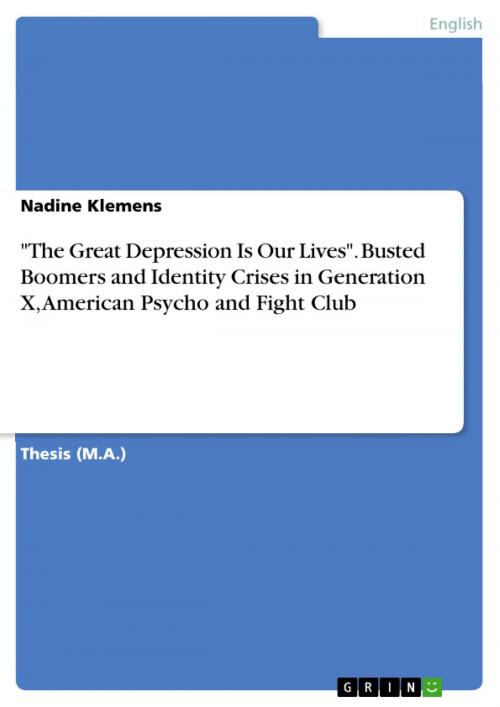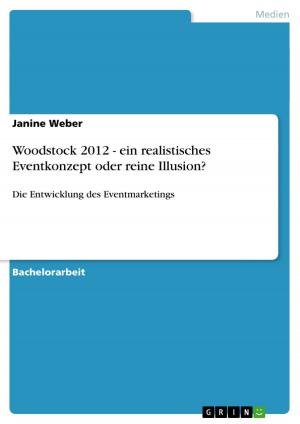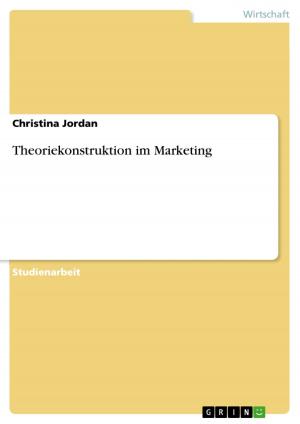'The Great Depression Is Our Lives'. Busted Boomers and Identity Crises in Generation X, American Psycho and Fight Club
Nonfiction, Entertainment, Drama, Anthologies| Author: | Nadine Klemens | ISBN: | 9783638476331 |
| Publisher: | GRIN Verlag | Publication: | March 7, 2006 |
| Imprint: | GRIN Verlag | Language: | English |
| Author: | Nadine Klemens |
| ISBN: | 9783638476331 |
| Publisher: | GRIN Verlag |
| Publication: | March 7, 2006 |
| Imprint: | GRIN Verlag |
| Language: | English |
Thesis (M.A.) from the year 2004 in the subject American Studies - Culture and Applied Geography, grade: sehr gut, Technical University of Braunschweig, 47 entries in the bibliography, language: English, abstract: 'We don't have a great war in our generation, or a great depression, but we do, we have a great war of the spirit. We have a great revolution against the culture. The great depression is our lives. We have a spiritual depression.' This is what the nameless narrator of Chuck Palahniuk's 1996 novel Fight Club says to define his generation, the age group which has alternately been labeled as 'Baby Bust Generation,' 'MTV Generation,' 'Invisible Generation,' or 'Generation X.' All of these terms apply to the birth cohort of the years 1961 to 1981. Since these young people are described by generational scholars as the most diverse generation in sociological history, it is not surprising that there are difficulties in finding one common label to define this birth group. The opening quote shows that the young people of this birth group seem to be in a spiritual crisis because they no longer have to fight in wars, they do not have to fight for causes - in short, they do not have to struggle through extreme situations as most generations before them had to do. Instead, they live in a world in which everything seems to be at the ready for them: tons of shopping malls and supermarkets that contain anything one can possibly think of or wish for. Yet, they experience a spiritual crisis. As many members of older generations may now well ask: How can a world of seemingly endless choices and resources be so disturbing as to throw a whole generation into crisis? Three novels that deal with the identity crisis of Generation X are analysed: Generation X. Tales for an Accelerated Culture (1991) by Douglas Coupland, American Psycho (1991) by Bret Easton Ellis, and Fight Club (1996) by Chuck Palahniuk. According to studies of Generation X literature, these three novels are typical of their time, as they deal with postmodern, or rather, consumerist culture. Hence, life in the postmodern condition presents the characters of the novels with questions and problems to which there is no definite answer. They struggle with a fragmented world and therefore, the novels show that whereas the generations preceding the Xer birth cohort had issues or events of historical scope and impact that bound them together as a birth group, it seems that the issue that binds Generation X together is their struggle with the culture they live in.
Thesis (M.A.) from the year 2004 in the subject American Studies - Culture and Applied Geography, grade: sehr gut, Technical University of Braunschweig, 47 entries in the bibliography, language: English, abstract: 'We don't have a great war in our generation, or a great depression, but we do, we have a great war of the spirit. We have a great revolution against the culture. The great depression is our lives. We have a spiritual depression.' This is what the nameless narrator of Chuck Palahniuk's 1996 novel Fight Club says to define his generation, the age group which has alternately been labeled as 'Baby Bust Generation,' 'MTV Generation,' 'Invisible Generation,' or 'Generation X.' All of these terms apply to the birth cohort of the years 1961 to 1981. Since these young people are described by generational scholars as the most diverse generation in sociological history, it is not surprising that there are difficulties in finding one common label to define this birth group. The opening quote shows that the young people of this birth group seem to be in a spiritual crisis because they no longer have to fight in wars, they do not have to fight for causes - in short, they do not have to struggle through extreme situations as most generations before them had to do. Instead, they live in a world in which everything seems to be at the ready for them: tons of shopping malls and supermarkets that contain anything one can possibly think of or wish for. Yet, they experience a spiritual crisis. As many members of older generations may now well ask: How can a world of seemingly endless choices and resources be so disturbing as to throw a whole generation into crisis? Three novels that deal with the identity crisis of Generation X are analysed: Generation X. Tales for an Accelerated Culture (1991) by Douglas Coupland, American Psycho (1991) by Bret Easton Ellis, and Fight Club (1996) by Chuck Palahniuk. According to studies of Generation X literature, these three novels are typical of their time, as they deal with postmodern, or rather, consumerist culture. Hence, life in the postmodern condition presents the characters of the novels with questions and problems to which there is no definite answer. They struggle with a fragmented world and therefore, the novels show that whereas the generations preceding the Xer birth cohort had issues or events of historical scope and impact that bound them together as a birth group, it seems that the issue that binds Generation X together is their struggle with the culture they live in.















